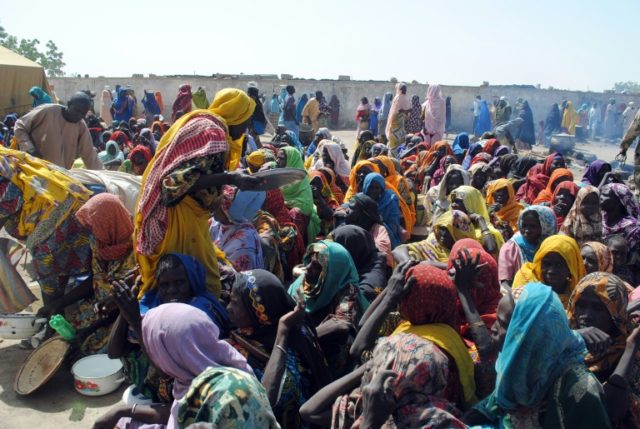Abuja (AFP) – Nearly 200 people have died in the last month at a camp for people made homeless by Boko Haram violence in northeast Nigeria, an aid agency said Wednesday, warning of a growing malnutrition crisis.
A Doctors Without Borders (MSF) team on Tuesday visited the camp, home to around 24,000 people including 15,000 children, and found what it called “a catastrophic humanitarian emergency” unfolding.
One in five of over 800 children it examined had severe acute malnutrition while 16 severely malnourished children “at immediate risk of death” were referred to its in-patient treatment centre.
At least 188 people have died in the internally displaced people (IDP) camp in Bama, some 70 kilometres (45 miles) from Maiduguri, since May 23 — about six a day — mainly from diarrhoea and malnutrition, MSF said in a statement.
A total of 1,233 graves, many of them of for children, had been dug near the camp in the past year, the agency said.
“This is the first time MSF has been able to access Bama but we already know the needs of the people there are beyond critical,” said MSF head of mission in Nigeria Ghada Hatim.
“We are treating malnourished children in medical facilities in Maiduguri and see the trauma on the faces of our patients who have witnessed and survived many horrors.”
– ‘Walking corpses’ –
The Borno state government and international aid agencies have previously warned about acute food shortages for IDPs in northeast Nigeria and the wider Lake Chad region.
On June 15, the Borno state government said it had transferred nearly 700 people, most of them children, from Bama to Maiduguri for treatment for severe malnutrition.
Sixty-one young children and babies were said to be “critically malnourished”.
A civilian vigilante and a soldier based in the remote town of Banki, 60 kilometres from Bama near the Cameroon border, told AFP this month at least 10 people were “starving to death” every day.
The vigilante said 376 people had been buried in the last three months and those still alive were like “walking corpses”.
– Security issues –
Boko Haram, whose seven-year Islamist insurgency in northeast Nigeria has left at least 20,000 dead and displaced more than 2.6 million, controlled swathes of territory in the northeast in 2014.
But the Nigerian government has said IDPs housed in camps or host communities can return after a military counter-offensive pushed the militants out of captured towns and villages.
Despite assurances the northeast is largely clear of the rebels, sporadic attacks continue and security remains an issue, while houses, businesses and farms have largely been destroyed.
Domestic and international aid agencies are mainly based in Maiduguri and dependent on Nigerian army assistance to access camps outside the city.
The Borno state governor Kashim Shettima last week ordered police to investigate reports that relief material, including bags of rice meant for IDPs, was being stolen.
The UN’s children’s agency, UNICEF, said it has been working with its partners in Bama since March and has provided health and nutrition support for some 19,000 people.
Its primary health care centre sees on average 140 patients a day for conditions ranging from malaria, respiratory infections and diarrhoea, as well as malnutrition screening and treatment.

COMMENTS
Please let us know if you're having issues with commenting.